Annual Report 2016
For the Atlantic Academy, 2016 was primarily concerned with the US presidential and congressional elections on November 8. Many of the topics that resulted from these elections flowed into meetings, education, and consultancy. In addition to these complex topics, the Atlantic Academy offered numerous opportunities to develop, exchange and discuss the various aspects of transatlantic relations.
These issues include the American debate on different constitutional rights, the views on the possession of firearms, abortion, the challenges in climate and energy policy, the state of a divided nation during the election and the transatlantic view of social problems such as violence against women. The conference of political scientists in the German Association for American Studies (DGfA), which is traditionally co-organized by the Atlantic Academy, took place this year in Berlin and devoted itself to the growing inequality in the USA.
During 2016, culture also played an important role. For the first time, we organized a Craft Beer Evening. In this short space of time, we were able to bring together Americans with other Americans, and of course Germans. Additionally, we supported the Hunsrueck-Hochwald national park during the organization of its first anniversary, offering a lecture on the national parks in the USA.
Undoubtedly, a highlight of the past year was the celebration of the 20th anniversary oft he Atlantic Academy in the Mainz State Chancellery. During this celebration, we were able to welcome Karsten Voigt, former lecturer and Commissioner for Transatlantic Relations, as well as members of the board. Also in attendance were members of Rhineland-Pfalz State Parliament, former Academy director Wolfgang Toennesmann, former Minister of the Interior and chairperson of the Academy, Karl-Perter Bruch, as well as former Prime Minister of Rheinland-Pfalz, Kurt Beck.
In addition to the successful events, 2016 brought the very sad news of the death of the Atlantic Academy’s founding director, Dr Werner Kremp, on April 1st. With his tireless dedication and wealth of ideas, he has not only laid the foundation for the Academy’s excellent work in its first 14 years, but he also took decisive steps to grow the organization.
We want to continue along this path, especially with the ever changing and growing challenges regarding the USA and transatlantic relations. Be it foreign and security issues or the similarities and differences in the economic, social or, generally speaking, domestic political area.
Wide Range of Projects
In the 2016 project year, the Atlantic Academy has carried out 83 projects. These include six Atlantic Forums, 23 workshops, two symposia, an exhibition, numerous seminars, panel discussions and our project “Welcome to Rhineland-Pfalz! Our neighbors from America.“ With this we have reached 4,384 participants.
Without school workshops, 60 projects were carried out this year by the Atlantic Academy. We have once again succeeded in further reducing the individual costs of the projects.
The PfalzAkademie Lambrecht was used twice for our events. In addition to a seminar on the American debate on firearms possession and abortion, we visited with our Summer School in August, as always.
Our Partners
Political education is no longer possible without cooperation and the resulting effects. With more than 48 partnerships, we have designed, organized and implemented many projects this year. As in previous years, the most important partners were the US Consulate General Frankfurt, the Political Science department at the Technical University of Kaiserslautern, the German-American International Women’s Club (DAIFC) Kaiserslautern, the Ingelheim Continuing Education Center and the Europe Direct Information Center Kaiserslautern.
We were able to create four additional partnerships this year, among others, with the Hunsrueck-Hochwald National Park and the “Gründerbüro” of the TU Kaiserslautern.
We also applied for and received grants from the Federal Center for Political Education (BpB) and the Regional Center for Political Education in Hesse and Rhineland-Palatinate for 2016. It should be emphasized that the funding by the BpB was significantly increased and was also granted for 2017. In addition, we have been able to obtain a high-end grant from the US Embassy Berlin for projects and infrastructure from October of 2016 to September of 2017. We were particularly pleased to receive a donation from the DAIFC of over 1,000 Euros for our work with youth.
Themes and Impressions
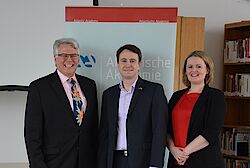
To show you the depth of our many projects, here are a few topics we have worked on.
2016 started with a visit from the American Consul General, Jim Herman, who visited our exhibition “International Orange“ and with whom we discussed important issues such as the refugee crisis, the role of NATO in Europe and TTIP.
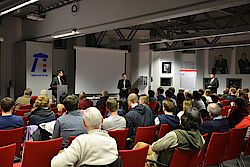
In our first Atlantic Academy Forum of the year, Dr. Marco Overhaus from the SWP Berlin devoted himself to the security policy of the USA and a possible change of course after the 2016 elections. With 67 interested citizens listening, this was the largest forum we have had. On average, we were able to have 56 participants. Other topics included the nuclear conflict with Iran, narratives in the US election, American exceptionalism, military policy and international organizations, as well as the commitment and success of the president in the legislative process.
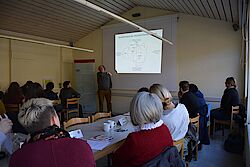
This year, the Atlantic Academy also organized the political seminar of the Association of German-American Clubs. This time the scholarship holders of the association met in Trier and discussed similarities and differences of the two countries political systems as well as the electoral and media system, foreign security and immigration policy.
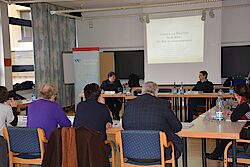
How do the constitutionally guaranteed rights to life and liberty correspond to the right to bear a weapon? Moreover, with the self-determination of women in reproduction decisions? The participants devoted themselves to these intriguing questions during a two-day seminar at the PfalzAkademie in Lambrecht. Three experts of American constitutional law, interest groups and US reproduction debates provided comprehensive insights into this field of constitutional law in four lectures.
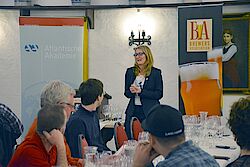
A very special cultural event took place in March when we devoted ourselves to the popular craft beer scene in the US. Thirty-nine interested and brew experienced guests participated in the tasting in the Burgsschaenke Kaiserslautern-Hohenecken. For this, we were able to book the official Craft Beer Ambassador of Europe as a speaker; the entire event was held in English. It was also surprising that the event sold out in a very short time. This event was supported by the American-German Business Club and strengthened the Academy’s event management portfolio.
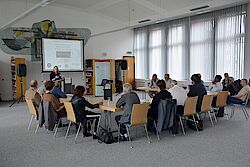
Our “Brownbag Luncheon on Entrepreneurship“ series, which was launched last year, together with the Economic Promotion Association Kaiserslautern and the US Consulate General, also took place in 2016. These included talks about the German tax system, the challenges and opportunities of the Brexit decision for the region and the establishment of home businesses. In addition, we were able to establish a more comprehensive partnership with the TU Kaiserslautern.
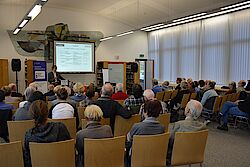
In a series that we established with our partner, the European Direct Information Center Kaiserslautern, we dealt with European and American energy and climate policies, and the future of US foreign and security policy on both sides of the Atlantic. We were able to attract a total of 126 citizens from Kaiserslautern and the surrounding areas.
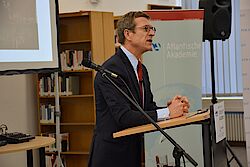
We invited the well-known journalist Christoph von Marschall to kick off a series of events for the presidential and congressional elections in the USA. The well known US expert and former White House correspondent of the Berlin Tagesspiegel attracted almost 90 guests to the library of the Academy.
The elections were also discussed in two teacher-training courses in Wiesbaden and Speyer. Together with the US Consulate General, the Hessian State Center for Political Education and the Educational Institute of the State of Speyer, we discussed the primaries and the mediation of the topics and complex issues in the classroom with the teachers.
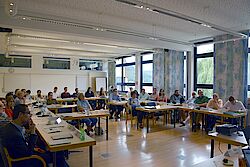
In 2016, the flagship of the Atlantic Academy, the Summer School, under the title “A Nation At Risk? The Uncertain States of America“, devoted itself to the upcoming election and the social and political state of the United States. At the end of the Obama era, we discussed the question of whether and how American society is able to find a way out of the polarization in order to cope with urgent social and economic crises.
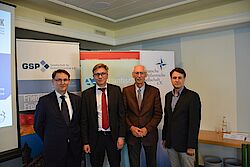
The same was true for our partnership event „Atlantic Summer“that we put on with the German Atlantic Society and the Bad Neuenahr-Ahrweiler section of the Organization for Security Policy. During this event, we took the election campaign as an opportunity to discuss US foreign and security policy, the nuclear conflict with Iran and the future dealings with Russia.
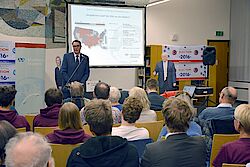
This was followed by a variety of discussion and lecture events, among others with Professor Andrea Roemmele from the Hertie School of Governance at the Heinrich Pesch House in Ludwigshafen, the office of the Friedrich Naumann Foundation in Waschington DC, Claus Gramckow at the Hilton Hotel Mainz and the SPD-Chairman Alexander Schweitzer in the Atlantic Academy.
Our event on election night was one of the highlights of the year. We were able to welcome 170 guests who expected an entertaining event. Particularly pleased were the large number of interested students who listened to lectures on the candidates, their media strategies, and the electoral system and its quirks. We also talked with the US correspondent of the Sueddeutsche Zeitung, Matthias Kolb, and a policy course by Professor Jody Neathery Castro from the University of Nebraska Omaha. In order to bypass the waiting time, the attendees were able to take pictures with cut outs of the candidate of their choice. The music for the night was provided by the band “Cosmic Brothers featuring Helmut Engelhardt”. Our electoral event received generous support from the Foundation of Gasanstalt Kaiserslautern AG (SWK) and the German-American and International Women’s Club Kaiserslautern.
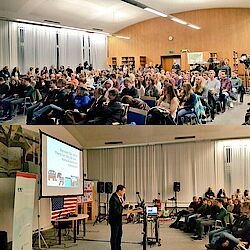
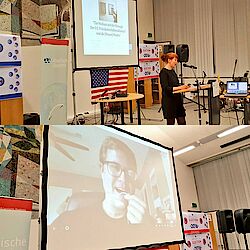
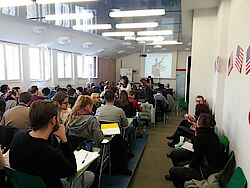
The election outcome, which was unexpected for the majority of observers, was taken up again in Berlin with the German Society for American Studies conference titled “Balancing the Scales. The United States in a Time of Inequality. “At the beginning, we were able to welcome 210 interested members to the Federal Press Office to a discussion session attended by Deputy Chief of Mission Kent Logsdon. We then set a record for the DGFA conference with 115 participants.
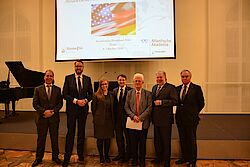
The highlight of the program year was, of course, the evening of the 20th anniversary of the Atlantic Academy. After the opening speech by the new Chairman of the Academy, State Secretary Randolf Stich, the former Commissioner for the Transatlantic Partnership, Karsten Voigt, gave a fantastic speech on the current state of transatlantic relations. A detailed report can be found in the articles section of the Atlantic Academy website.
The Employees of the Atlantic Academy - Expertise
In addition to many lectures and events put on by the Atlantic Academy, the Director of the Academy also visited the European Spring Academy of the European Academy in Otzenhausen, where he gave a lecture titled: More Cooperation or a New Alienation? The Status of Transatlantic Relations between Europe and the US.“ This lecture was on the foreign policy of the Obama administration in the run up to and after the election. Further talks were given at the Rotary Club Kaiserslautern-Kurpfalz, the Economic Council of the CDU, and the Lions Club Ingelheim. At the invitation of the Warburg Chapter of the American Council on Germany, Dr. Sirakov undertook a lecture trip to the USA and visited the Chapters in Charlotte (NC), Atlanta (GA), Boca Raton (FL) and Los Angeles (CA). The lecture “The Rise and Challenges of Authoritarian Populism in Europe and the United States“ was met with a very positive response.
During the ring lecture “Representing the American People“ at the University of the Saarland, the education assistant Sarah Wagner spoke on the topic “What you see is what you get? The media and the US elections“. She also spoke about the elections in the USA at the Mainz-Louisville Circle of Friends.
Special Project “Welcome to Rheinland-Pfalz! – Your neighbor from America”
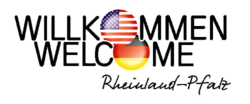
In 2016, the Atlantic Academy of Rheinland-Pfalz was the first to carry out the project “Welcome to Rheinland-Pfalz. Our Neighbors from the USA.“ The goal of this project is to create opportunities for US citizens to integrate into everyday German life. For the US families, the improved distribution and creation of information on local and regional offers increase integration into and identification with their place of residence. In addition to the effects on a positive and open German-American community life, the exploration of local associations and local services is important for the communities involved.
Taking a holistic approach to the project, the establishment of online offerings has been recognized as a follow up to the municipal efforts on the ground and has been realized by setting up a Facebook page and website. The initial project website was designed to serve as a regional orientation platform for residents and newly recruited US soldiers and their families in Rheinland-Pfalz. For this reason, the local authorities were intensively supportive in sharing local information. The importance of the Facebook community has rapidly increased by the continuous additions of useful information and services that the US families can use.
Our application to continue the project in 2017 was accepted by the Ministry of the Interior and Sport. This means that we will be able to continue our efforts to further develop the content and to strengthen the coexistence of the Rheinland- Pfalz municipalities and their American citizens.
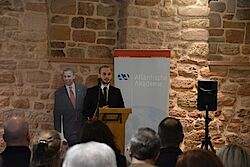
Through intensive public relations work, the project’s perception has steadily increased. Within the framework of the German-American Friendship Day, organized by the Atlantic Academy in partnership with the DAIFC and the Docu Center Ramstein, on November 5th the project coordinator John Constance presented the project to a broad public consisting of the leading figures of the military community, municipal representatives, and interested citizens.
Publications „Atlantic Texts“ and „Atlantic Issues“
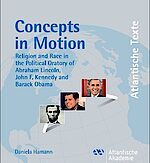
The promotion of American related texts continues to be a central concern of the Atlantic Academy.
This includes our publication series „Atlantic Texts“. This year, a volume for the Atlantic Academy has appeared cost effective with Daniela Hamann’s concept of religion and ethnicity in the rhetoric of the US presidents.
In addition, the Academy accompanied the primary and main election campaign with short papers by well knows US experts with the online series „The Atlantic Academy’s Road to the US Elections“ within the „Atlantic Themes“. The series was met with national and international resonance.
Social Networks, The New Website and the Work of the Atlantic Academy
The involvement of the Atlantic Academy in social networks such as Twitter (@AtlantAkademie) and Facebook (@AtlantischeAkademie) has continued in 2016. The number of those who follow our channels has risen. Among the new followers are the Coordinator for the Transatlantic Partnership Juergen Hardt, personalities from national politics such as Pia Schellhammer, Gerd Schreiner, Alexander Schweitzer and Giorgina Kazungu-Hass, the US correspondents of the Sueddetsche Zeitung, the ARD and the Spiegel, Matthias Kolb, Ina Ruck and Marc Pitzke, as well as the political foundations of the CDU, the SPD and the FDP.
In 2016 there was also a change in the Academy’s website. With its new design, the site is more open, more clearly structured and responsive. Our press releases, interviews, seminar reports and notes can be found in a comprehensive and individual overview under the tab ‘News’. The news archives contain notifications that are older than one year. Our current projects such as exhibitions, events, school workshops and our special project „Welcome to Rhineland-Pfalz“ can be accessed under ‘program’. The latest projects are always immediately visible. If you are already looking for programs, you can find them in the program archive. The various publications of the Academy can be browsed through and the Atlantic texts can be ordered online. Information about the Atlantic Academy, its concept, the team, the club and the board are also online.
The launch of the English-language website is planned for February of 2017. In doing so, all static content, such as the general information on the publications and the Academy, as well as all sections, will be available in English.
Press
In the course of the presidential and congressional elections in the USA, the Atlantic Academy enjoyed extensive media attention.
In the field of print media, several interviews were published with the director and the education representative as well as reports based on talks with the education representative and the director in the Rheinzeitung, the Trierisch Volksfreund, the Rheinplatz, or the magazine of the federal centers for political education „Fluter. Radio broadcasters such as SWR 1 and 4 and Saarland Radio (SR2) also conducted interviews with Dr. Sirakov and the SWR televised the interviews showing great interest in the Academy’s expertise. Two camera teams accompanied our electoral events on election night.
New Challenges and Opportunities for the Academy
The Atlantic Academy looks back on its successful program year and at major challenges in the coming year.
Our programming has overseen 40 events, which include regular series such as the Atlantic Forums, the Summer School, the partnership with the Kaiserslautern Business Promotion (Brown Bag Luncheon) and the Europe Direct Information Center events. One focus of the year 2017 will be the discussion of the deep division in American society and politics and, of course, the political program of the new administration under Donald J Trump. For this reason, we have been working on a continuation of our successful publication series entitled “The Road Ahead – Analysis of the Trump Administration“, in which well-known US experts will again discuss the new presidency.
The consequences of the electoral decisions last November for transatlantic relations, as well as international relations as a whole, are difficult to predict. However, central changes in the foreign, security and economic policy of the United States are already apparent with regard to the personnel decisions of the designated president and do not necessarily promise good results. Many of these topics will occupy us much more in the coming months and already make one thing clear: the central task of the Atlantic Academy as a bridge builder is more important than ever in these times. We will continue to accept the challenges in the future with much energy and new ideas.



